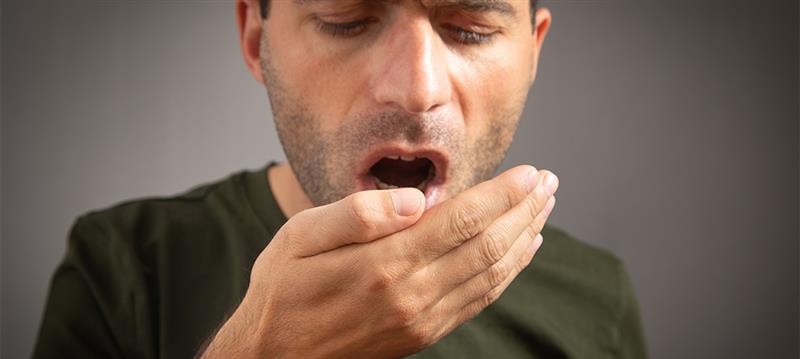 20 Old Brompton Road, South Kensington, London, SW7 3DL
20 Old Brompton Road, South Kensington, London, SW7 3DLWe Are Now Open On Saturdays
We Are Now Open On Saturdays
- Book My Appointment
- 020 31375055
We Are Now Open On Saturdays
We Are Now Open On Saturdays
Located at 20 Old Brompton Road – Just Steps from ![]() South Kensington Tube. Easy Access, Always.
South Kensington Tube. Easy Access, Always.

Bad breath, or halitosis as it’s medically known, is something many of us have experienced at some point. Whether it’s the lingering smell after a strong cup of coffee or that unpleasant morning breath when you wake up, it’s an issue that affects millions of people in the UK. According to dental studies, nearly 40% of adults occasionally deal with bad breath due to factors like poor oral hygiene, smoking, and diets rich in processed foods or garlic-heavy meals. The good news? With consistent care and proper hygiene practices, fresh breath is entirely achievable. In this UK guide, we’ll explore practical, dentist-approved ways to stop bad breath naturally and effectively - because everyone deserves to feel confident about their smile.
Understanding what causes bad breath is the first step toward fixing it. One common culprit is bacterial buildup in your mouth. These bacteria thrive on food particles stuck between teeth or on the tongue, producing sulfur compounds that cause odour. Morning breath happens because saliva production slows down during sleep, creating a dry environment where bacteria flourish. Poor brushing habits, gum disease, dehydration, and even certain medical conditions like acid reflux can also contribute to persistent halitosis.
If you’re wondering what causes morning breath and how to prevent it, start by maintaining excellent oral hygiene before bed. Brush thoroughly, floss daily, and consider using a humidifier if dry air exacerbates your symptoms overnight. However, if bad breath persists despite these efforts - or if you notice signs like bleeding gums or a metallic taste - it may be time to consult a professional.
Persistent bad breath could signal underlying issues such as gum disease, cavities, or infections. If home remedies don’t work, schedule an appointment with your dentist. They can perform a thorough check-up and recommend treatments tailored to your needs. For more information, you can always refer to trusted resources like the NHS or local clinics offering specialised care.
Book an appointment with our dental hygienist in London today and get a professional cleaning that keeps your mouth fresh and healthy.
Preventing bad breath doesn’t require expensive products; simple, natural methods often do the trick. Here are a few tried-and-tested tips:
These small yet impactful changes can make a world of difference without breaking the bank.
Did you know that most odour-causing bacteria reside on your tongue? That’s why cleaning your tongue is just as important as brushing your teeth. A coated tongue traps bacteria, leading to unpleasant smells. Using a tongue scraper offers significant benefits, including reducing bad breath and improving overall oral health.
A tongue scraper removes bacteria, dead cells, and food residue more effectively than simply brushing your tongue. To use one:
For best results, incorporate this into both your morning and night routines. If you don’t own a scraper, a toothbrush with a built-in tongue cleaner works well too.
Diet plays a crucial role in managing bad breath. Certain foods act as natural breath fresheners, while others should be avoided altogether.
On the flip side, steer clear of garlic, onions, alcohol, and sugary drinks, as they can exacerbate bad breath. And speaking of lifestyle choices…
Smoking dries out your mouth and promotes bacterial growth, making breath smell worse. Quitting not only improves your oral health but also boosts confidence and overall wellbeing. Consider seeking support through NHS smoking cessation programmes available nationwide.
Sometimes, our bad breath woes stem from easily avoidable mistakes. Let’s break them down:
By avoiding these pitfalls, you’ll significantly reduce your risk of bad breath.
Dry mouth (xerostomia) is another major contributor to halitosis. Saliva helps cleanse the mouth by washing away food particles and neutralising acids produced by bacteria. Without enough saliva, odour-causing bacteria multiply rapidly.
To combat dry mouth:
If chronic dryness persists, consult your GP or dentist. They can rule out underlying conditions like Sjögren’s syndrome or side effects from medications.
While manual tools get the job done, advancements in dental technology offer additional benefits. Electric toothbrushes, for instance, are highly effective at removing plaque compared to manual brushes. Studies conducted in the UK show that electric models reduce gingivitis and improve overall oral hygiene.
Regular visits to your dentist are equally vital. Professional cleanings remove tartar buildup that regular brushing can’t tackle. Scaling procedures target deep-seated plaque, preventing gum disease and keeping breath fresh.
Home remedies are great, but they aren’t always sufficient. If you’ve addressed all possible causes of bad breath and still struggle, it’s time to seek professional help. Signs include:
Your local dental hygienist can provide a deep clean and personalised advice. Remember, early intervention prevents larger problems down the line.
Fresh breath isn’t reserved for those with perfect genetics - it’s within reach for anyone willing to put in a little effort. By adopting key hygiene habits like brushing, flossing, and tongue cleaning, along with mindful lifestyle choices, you can banish bad breath for good. Consistency trumps costly gadgets; focus on doing the basics right every day.
So why wait? Take charge of your oral health today. Book a dental hygiene appointment to keep your breath fresh and confident!